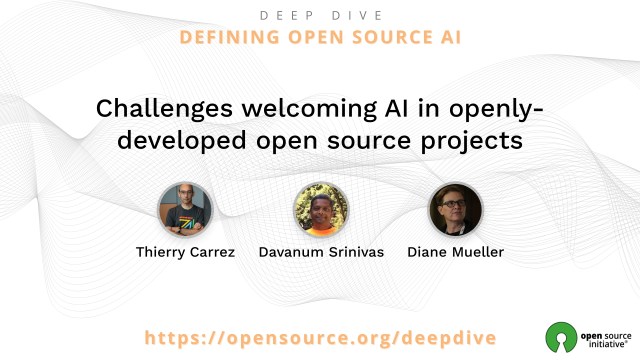Part of the Deep Dive: AI Webinar Series

Openly-developed open source projects are projects that are developed in a decentralized manner, fully harnessing the power of communities by going beyond open source to also require open development, open design and open community (the 4 opens). This open approach to innovation has led to creation of very popular open source infrastructure technologies like OpenStack or Kubernetes.
With the rise of generative solutions and LLMs, we are expecting more and more code to be produced, directly or indirectly, by AI. Expected efficiencies may save millions of dollars. But at what cost? How is that going to affect the 4 opens? What are the challenges in welcoming AI in our open communities?
This webinar will explore questions such as:
– Can AI-generated code be accepted in projects under an open source license?
– How can we expect open design processes to evolve in a AI world?
– Is it possible to avoid that the burden just shifts from code authoring to code reviewing?
– What does open community mean with AI-powered participants? Is there a risk to create a second class of community members?
Webinar summary
In this webinar hosted by the Open Source Initiative as a part of the “Deep Dive: Defining Open Source AI” series, a panel of open source community leaders, including Thierry Carrez, Diane Mueller, and Dims Srinivasi, explores the challenges and implications of integrating AI into open source projects. They discuss the impact of AI on the four facets of open collaboration: open source, open development, open design, and open community. The panelists express concerns about the potential influx of AI-generated contributions, putting added pressure on project reviewers and maintainers. They highlight the need for transparency, ethics, and governance in handling AI-generated code, emphasizing the importance of credit, consent, and compensation for creators. The discussion also touches on the potential benefits of AI in automating code generation, bug detection, and even collaborative design processes while raising questions about biases in AI-generated content. Ultimately, the panel envisions a future where AI plays a significant role in open source, but ethical and governance challenges need to be addressed.
[publishpress_authors_box]
